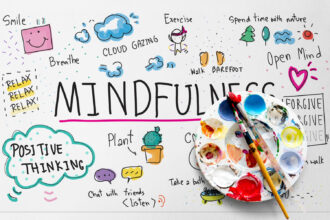In today’s fast-paced world, many of us find ourselves constantly juggling multiple tasks, thoughts, and responsibilities. Moreover, we often get caught up in the worries of the past or the uncertainties of the future. Consequently, this can lead to stress, anxiety, and a sense of disconnection from the present moment. However, there is a powerful practice that can help us counter these challenges and bring us back to a state of calm and clarity. This practice is called mindfulness.
What is Mindfulness?
Mindfulness is the intentional practice of focusing our attention on the present moment, without judgment or attachment. It involves fully engaging in our thoughts, emotions, bodily sensations, and environment with curiosity and acceptance. Instead of dwelling on the past or worrying about the future, mindfulness grounds us in the present.
In today’s fast-paced world, our minds often wander, replaying past events or anticipating the future. This constant mental chatter can lead to stress, anxiety, and a disconnection from the present. However, mindfulness provides a solution by bringing us back to the here and now.
When practicing mindfulness, we deliberately direct our attention to the present moment and observe our experiences without judgment. We embrace our thoughts, emotions, and bodily sensations without being overwhelmed by them or labeling them. Instead, we foster curiosity and explore our inner world and surroundings with fresh perspective. Through mindfulness, we also develop self-awareness, recognizing patterns and triggers that contribute to stress and discomfort.
Incorporating mindfulness into our daily lives brings a range of benefits. Firstly, it helps reduce stress and promotes relaxation as we bring our attention to the present moment, letting go of worries about the past or future. This allows our bodies and minds to find a sense of calm. Secondly, mindfulness improves our emotional well-being by observing our thoughts and emotions without judgment. This cultivates a compassionate relationship with our inner experiences and helps us navigate difficult emotions with more ease. Additionally, it enables us to respond to challenges in a more balanced and constructive way.
Furthermore, mindfulness enhances our focus and concentration. In a world full of distractions, practicing present-moment awareness improves our ability to concentrate and boosts productivity. By training our minds to stay grounded in the present, we minimize the impact of external distractions and remain fully engaged in our tasks.
Lastly, mindfulness cultivates a deeper sense of connection and appreciation for life. By being fully present, we can savor the simple joys and experiences that often go unnoticed. We become more attuned to the beauty of nature, the taste of food, and the richness of our relationships. Mindfulness allows us to slow down, to truly listen, and to be fully present with ourselves and others.
Benefits of Mindfulness

- Reduced Stress and Anxiety: Mindfulness has been shown to effectively reduce stress and anxiety by shifting our focus from worries and future uncertainties to the present moment. By cultivating awareness of our thoughts and emotions without judgment, we can develop a greater sense of calm and inner peace.
- Improved Mental Health: Practicing mindfulness has been linked to improvements in mental health conditions such as depression and post-traumatic stress disorder (PTSD). By being present with our experiences, we can develop a more compassionate and non-reactive relationship with our thoughts and emotions, fostering greater emotional well-being.
- Enhanced Focus and Concentration: Mindfulness exercises, such as meditation or mindful breathing, can help improve our ability to sustain focus and concentrate on tasks. By training our minds to stay present, we can minimize distractions and increase our productivity and effectiveness.
- Better Emotional Regulation: Mindfulness allows us to observe our emotions as they arise, without being overwhelmed or controlled by them. This increased self-awareness and emotional regulation enable us to respond to challenging situations with greater wisdom and equanimity.
- Increased Self-Compassion and Empathy: When we practice mindfulness, we cultivate a non-judgmental attitude towards ourselves and others. This attitude of acceptance and compassion helps us develop a deeper sense of self-care and empathy for others, strengthening our relationships and fostering a more harmonious social environment.
Incorporating Mindfulness into Daily Life

Incorporating mindfulness into our daily lives is accessible and adaptable to our individual preferences and schedules. It doesn’t require a significant time commitment or elaborate rituals. Here are some practical ways to integrate mindfulness into your daily routine:
- Mindful Breathing: Take a few minutes daily to focus on your breath. Find a quiet space, sit comfortably, and observe the sensations without judgment. Calm your mind and be present.
- Mindful Eating: Slow down and savor each bite. Pay attention to taste, texture, and aroma. Engage your senses and appreciate the nourishment and enjoyment of food.
- Mindful Walking: Step outside, feel your body in motion, notice the ground beneath your feet, and embrace nature’s sights and sounds.
- Body Scan Meditation: Set aside time for a body scan meditation. Sit or lie down, scan your body from head to toe, and observe sensations, tension, and relaxation. Cultivate body awareness and promote relaxation.
- Loving-Kindness Meditation: Practice compassion and goodwill. Repeat positive phrases like “May I be happy, healthy, and at ease.” Extend these wishes to others, fostering connection and empathy.
Mindfulness brings non-judgmental awareness to daily experiences. Be fully present, engaged, and curious. Start small and expand your practice gradually for natural and beneficial results.
Conclusion: Mindfulness offers the power of present-moment awareness. Reduce stress, improve mental health, enhance focus, regulate emotions, and foster self-compassion. Embrace mindfulness and unlock the transformative potential of the present moment.













